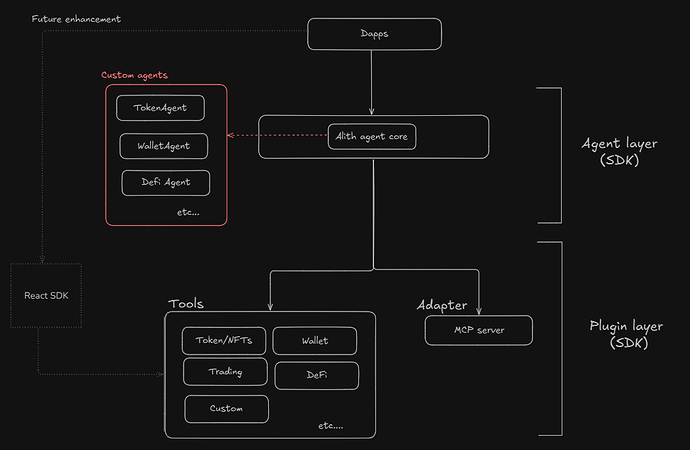AgentHub: “AI agent Toolkit for plug-and-play Web3 development with pre-built protocol integrations”
Bridging the Complexity Gap in AI Agent Development for Web3
Problem Statement
Current AI agent frameworks like Alith require developers to manually code every tool and integration from scratch. This creates several critical barriers:
- Development Bottleneck: Developers spend 70-80% of their time writing boilerplate tool integrations instead of focusing on core agent logic
- Expertise Barrier: Building Web3 tools requires deep knowledge of DeFi protocols, smart contracts, and blockchain interactions
- Fragmentation: Each team rebuilds the same tools (token swaps, wallet interactions, DeFi protocols) independently
- Slow Time-to-Market: Simple agent ideas take weeks to implement due to tool development overhead
- Limited Accessibility: Non-technical users cannot leverage AI agents for Web3 interactions
Solution Overview
AgentHub revolutionizes Web3 AI agent development by providing a comprehensive plugin ecosystem that eliminates the need for manual tool development. Our solution transforms the current “build-from-scratch” paradigm into a “plug-and-play” experience, reducing development time from weeks to hours.
How AgentHub Addresses the Problem
Plug-and-Play Architecture: Instead of developers writing custom integrations for every Web3 interaction, AgentHub provides pre-built, battle-tested tools for common operations like token swaps, wallet management, DeFi protocols, and smart contract interactions - with endless possibilities for tool expansion across the entire Web3 ecosystem.
Multi-Layer Flexibility: Our architecture offers three levels of abstraction - from ready-to-use specialized agents (TokenAgent, DeFiAgent) for instant deployment, to granular plugin tools for custom implementations.
Universal Compatibility: Through MCP (Model Context Protocol) servers, any AI framework can seamlessly integrate with our tools via standardized APIs, maximizing interoperability.
What Makes AgentHub Innovative
Hyperion-Native Performance: Built specifically for Hyperion’s parallel execution capabilities, our tools leverage MetisVM optimizations for unprecedented performance in Web3 AI applications.
Dual-Facing Plugin Ecosystem: Unlike existing frameworks that focus solely on either developers or end-users, AgentHub provides tools for both audiences.
Zero-Code to Full-Code Spectrum: Users can deploy sophisticated AI agents with a single line of code, while advanced developers can access granular plugin APIs.
Project Description
Architecture Overview
AgentHub is built on a modular two-layer architecture designed for flexibility, performance, and ease of use within the Hyperion ecosystem.
A. Agent Layer (SDK)
The Agent Layer serves as the primary interface for developers and provides two distinct categories of AI agents:
1. Alith Agent Core
- Foundational Alith agent provided by the Alith framework
- Handles core AI inference, decision-making, and Web3 interactions
- Optimized for Hyperion’s parallel execution and MetisVM performance
2. Custom Specialized Agents
Our SDK provides pre-configured, domain-specific agents that combine the Alith core with specialized toolsets:
- TokenAgent: Alith Core + Token/NFT management tools
- WalletAgent: Alith Core + Wallet interaction tools
- DeFiAgent: Alith Core + DeFi protocol tools
- More coming soon!
These specialized agents can be instantiated with a single line of code.
B. Plugin Layer (SDK)
The Plugin Layer provides the foundational tools and infrastructure that power the Agent Layer:
1. Direct Tools Integration
A comprehensive library of pre-built tools with endless possibilities across the Web3 ecosystem:
Developer-Facing Tools:
- Smart contract compilation, deployment, and verification
- Code generation and optimization utilities
- Cross-chain bridge integrations
- And many more possibilities
User-Facing Tools:
- Token swapping and portfolio management
- DeFi protocol interactions
- NFT marketplace operations
- Wallet connection and transaction signing
- Limitless potential for any Web3 interaction
2. MCP Server Adapter
For developers who prefer API-based integration or are using non-Alith AI frameworks:
- Exposes all plugin tools through standardized MCP (Model Context Protocol) APIs
- Enables any AI agent framework to access AgentHub’s functionality
- Provides RESTful endpoints for seamless integration
- Maintains consistency with direct tool integration while offering universal compatibility
Future Enhancement
React Component Library: A planned addition to provide full-stack, ready-to-use UI components that directly interface with AgentHub tools, enabling traditional web developers to build Web3 applications without AI integration complexity.
Community Engagement Features
Given AgentHub’s developer-focused nature and current ideation phase, our community engagement will center around technical participation. Details will be shared later.
Getting Involved
For Early Contributors:
- Follow our project updates on the HyperHack forum
- Join discussions about tool requirements and SDK design
For Future Participation:
- GitHub repository and documentation will be available soon
- Discord/Telegram developer community will be established during development phase
